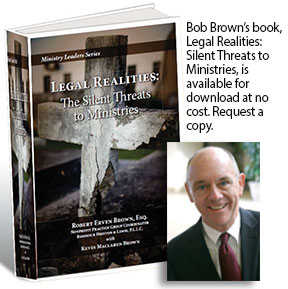 “Why don’t they consider the elder’s spouse in the selection and training process?”, Tisha asked as we chatted. I was interviewing her as part of my due diligence evaluation of her company, “After the Fact — Final Affairs,” which assists in the administration and closing of probate matters.
“Why don’t they consider the elder’s spouse in the selection and training process?”, Tisha asked as we chatted. I was interviewing her as part of my due diligence evaluation of her company, “After the Fact — Final Affairs,” which assists in the administration and closing of probate matters.
As we chatted, her comments as the wife of an elder in a local, midsize church reminded me of a recurring theme among many church and para-church ministries: the failure to properly select, recruit, train and retain directors (elders) of the church corporation. An often-overlooked part of that process is including the spouses of the elders.
The directors of the corporation often set the course for the church, for good or bad! So, the process of putting the right people in the right positions, with the right training, is critical. Having a good husband-wife team can enhance the experience for an elder, so here are some insights from our conversation about this important topic.
Bob: Tell me a little about your church background.
Tisha: I was raised Southern Baptist in the Midwest Bible belt. Our family attended church regularly and was involved with volunteering. My father use to say, “I’ll never be a Deacon, but I’ll always support the church.” I never understood what that meant until I was much older.
Bob: How did you and your husband get involved in the church?
Tisha: We were seekers when we got married. Although both of us professed to be Christians, we didn’t really have a relationship with Christ and weren’t committed to the truth. When we were baptized together 10 years ago, it really made a difference in our lives. We then made a commitment to serving and supporting the church — not just with time, but with finances, lifestyle, commitment to the mission, and unconditional love of imperfect people. That’s when we began our journey of volunteering.
Bob: How did your husband become an elder?
Tisha: He has an educational background in HR, and God gave him a very calm demeanor. The pastor of the church was young, and the entire elder team was inexperienced, so he brought an “elder” perspective — not just through experience, but also age. In my humble opinion, he was a great elder and is a great man of God.
Bob: How did you support your husband in that position?
Tisha: Funny you should ask. Personally, I think I did an inadequate job. Not because I didn’t believe in him or the church, but because I really didn’t know what to do. When the elder board was formed, it was the first time the other wives and I had ever been in this position. We didn’t have anyone — meaning an experienced wife — in a position that could give us direction, advice, perspective, comfort, and most of all, a way to help us support our husbands.
Bob: What do you mean by that?
Tisha: Well, you can go to the bookstore and purchase a self-help book on any subject imaginable, with the exception of this topic. Don’t get me wrong; you can Google the topic (I did), and 83 million results come up, but they’re always from the perspective of how it benefits the husband and the church. There are very few, if any, results from the perspective of the wife and how she supports the husband in that “behind-the-scenes role.” I believe that an exceptional elder always has an exceptional wife behind him, regardless of the circumstances or the situation.
Since we were all new to the position, there was no reference for us on how to do simple things, such as praying. How can we pray for our husbands? How can we listen with an open heart as to the mission of the church and respond accordingly? How can we give feedback without being overbearing or critical? How can we be supportive when problems arise without getting frustrated and wanting to walk away? These were basic fundamental issues that we struggled with.
Bob: How did you resolve this issue?
Tisha: Ultimately, I don’t think we, the wives, really did. We would meet on a semi-regular basis, but it was around studying a topic. Not that it was bad, just that it wasn’t the focus of where I felt we needed to spend out energy. Any time you study of the Word of God, it’s beneficial; but, we never addressed the issue of how we can be better and support our husbands so they can be better and support the pastor and the church. When you have no experience and are leading people with no experience, it’s like walking around the mountain again and again and again.
Bob: What would you do differently, knowing what you know now?
Tisha: First and foremost, I would know what the time commitment is really like — not just my husband being at meetings or at the church, but the additional mental and emotional time that it takes. I would be a lot more patient with my husband talking about the church from a business perspective, understanding that, at the end of the day, it is a business. I would pray for a unified group of men who support the mission of the church and for a unified group of women who are committed to being helpers to their husbands. I would definitely lean more heavily on the other wives when I felt overwhelmed with everything instead of putting that pressure on my husband. I wouldn’t worry so much about what others — meaning the church congregation — thought about me. An imperfect, authentic person is much more valuable to the church than a pretend-perfect person. I would judge less harshly and quickly; unless you walk in another person’s shoes, you have no idea what they’re going through. And most of all, I would seek the council of women who have been in this position before.
Bob: What advice would you give wives of new elders?
Tisha: Don’t be afraid to seek the advice and friendship of wives who have been there or are doing it. They are your best source for support and advice, and most have an open, compassionate, wise heart. Always ask for the truth, even if you don’t want to hear it. Be willing to say no when it’s appropriate. Your primary job is to support your husband, not pick up the slack when the church needs a fill-in.
 Robert Erven Brown is an attorney licensed to practice in Arizona. He and his nonprofit practice group work with nonprofits and churches helping them manage key operations connected with their missions, visions and causes. As permitted by local Rules of Ethics, they collaborate with attorneys who are licensed in states other than Arizona. Bob is author of Legal Realities: Silent Threats to Ministries, which describes his Campus Preservation Planning© initiative — a comprehensive program designed to manage the wide array of risks facing non-profit organizations. He can be reached by email or by calling 602.744.5748. RHL is located at 201 North Central Ave., Suite 3300, Phoenix, AZ 85004.
Robert Erven Brown is an attorney licensed to practice in Arizona. He and his nonprofit practice group work with nonprofits and churches helping them manage key operations connected with their missions, visions and causes. As permitted by local Rules of Ethics, they collaborate with attorneys who are licensed in states other than Arizona. Bob is author of Legal Realities: Silent Threats to Ministries, which describes his Campus Preservation Planning© initiative — a comprehensive program designed to manage the wide array of risks facing non-profit organizations. He can be reached by email or by calling 602.744.5748. RHL is located at 201 North Central Ave., Suite 3300, Phoenix, AZ 85004.


